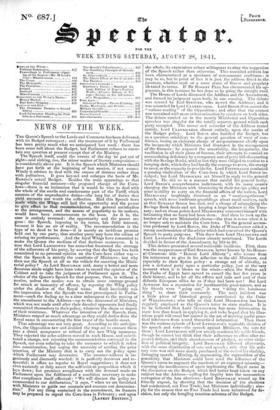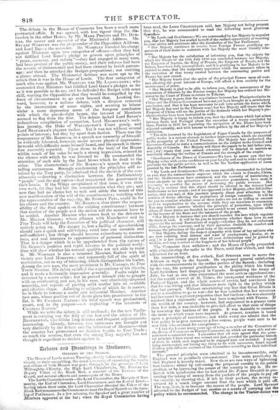NEWS OF THE WEEK.
THE Queen's Speech to the Lords and Commons has been delivered, with its Budget retrospect ; and the treatment of it by Parliament has been pretty much what we anticipated last week : there has been some talk about the Budget, but Parliament refuses to enter- tain any question at present except that of the Ministry.
The Speech itself, could the events of the day be put out of wIght—and sinking, too, the minor matter of literary composition— is considerably above par. It is the Speech which Ministers should have put forth at the beginning of last session, if not sooner. 'Wisely it advises to deal with the causes of distress rather than with palliatives. It goes beyond and enlarges the basis of Mr. Baanw's actual Budget. Besides the main appendage to that singular financial measure—the proposed change of the Corn- laws—there is an intimation that it would be wise to deal with the whole of the sterile and cumbersome part of the Tariff, which consists of the unproductive duties—the long list of duties that yield amounts not worth the collection. Had this Speech been made while the Whigs still had the opportunity and the power to give effect to that recommendation, the general satisfaction at the arrangement, and the access of popularity to its authors, would have been commensurate to the boon. As it is, the case is entirely reversed: the opportunity and the power are gone : the Speech, imposing in its terms, Mrs little interest, because it has no air of reality. The recommendation is the type of no deed to be done—it is merely an invidious promise held out by one party, that another party may have the odium of refusing its performance. And the loyal Whigs have consented to make the Queen the medium of that factious manoeuvre. It is true that Lord LANSDOWNE has somewhat frustrated the strategy of the adherents of his party, by avowing that the Queen has been committed to no personal opinion on the Corn-laws either way— that the Speech is strictly the manifesto of Ministers : but why then use the Speech at all as the vehicle for asserting the Minis- terial policy? As Lord BROUGHAM said, many a better and more decorous mode might have been taken to record the opinion of the Cabinet and to take the judgment of Parliament upon it. The choice of the Queen's Speech for that purpose, then, is without a motive, unless the motive was to obtain some vantage-ground for attack or immunity of offence, by reposing the Whig policy
under the shadow of the Royal name. Such inevitably was the impression when the Speesh was first promulgated in Parlia- ment—such the feeling up to a time subsequent to the moving of the amendment to the Address—up to the disavowal of Ministers, which was not made until after their dreaded opponents had finally committed themselves to their policy, whatever the shape or degree of their resistance. Whatever the intention of the Speech, then, Ministers reaped as much advantage as they could derive from the Royal name in encountering the first brunt of the hostile onset. That advantage was not very great. According to the anticipa- tion, the Opposition saw and avoided the trap set to ensnare them into a direct acceptance or refusal of the new Whig measures. They rejected the echo-address moved in each House, and substi- tuted a change, not rejecting the recommendation conveyed in the Speech, not even refusing to take the measures to which it refers into consideration, but urging the necessity of settling the prior 'question, of the Ministry that is to carry out the policy upon which Parliament may determine. The counter-address is in- geniously and discreetly worded : it is perfectly decorous and re- spectful; it offers no repulse to Royal suggestions; it does not even austerely or drily assert the self-evident proposition which it lays down; but promises compliance with the demand made on Parliament upon the fulfilment of a condition necessary to make that compliance itself effectual : " We will discuss the policy re- commended to our deliberation," it says, " when we are furnished with Ministers to guide our counsels and execute our determina- tion." For any thing contained in the amendment, its framers may be prepared to repeal the Corn-laws in February ; and upon [LATEST EDITION.i the whole, its expressions evince willingness to obey the suggestion of the Speech rather than otherwise. This amended address has been characterized as a specimen of consummate craftiness : it may be so, but in point of fact it is just the address fitted to the
juncture, whether craft or a mere sense of fitness and propriety dictated its terms. If Sir ROBERT PEEL has circumvented his op- ponents, in this instance he has done so by going the straight road. The House of Lords discussed the Address and the Amendment, and formed its judgment upon both, in one evening. The debate was opened by Earl SPENCER, who moved the Address ; and it was seconded by Lord CLANRICARDE. Lord RIPON then moved the " various reading " of the Opposition ; and after that the contest was sustained with more or less animation by speakers on both sides. The debate carried on in the merely Ministerial and Opposition speeches was singular for the totally separate ground which each party occupied. The mover and seconder of the Address rested mainly, Lord CLANRICARDE almost entirely, upon the merits of the Budget policy. Lord RIPON also handled the Budget, but as a question subsidiary to the general question of want of con- fidence, basing an elaborate charge of misgovernment chiefly upon the incapacity which Ministers had displayed in the management of the finances : he exposed the uncertainty, the irregularity, the vacillation in all their plans of finance, their attempts to conceal an
accumulating deficiency by a temporary sort of petty hill-discounting with the Savings Banks, until at last they were obliged to confess to a
lumping debt, which they had hardly the courage to avow, the energy to meet, or the capacity to provide for. Lord FITZWILLIAM combated a passing vindication of the Corn-laws in which Lord Ripon in- dulged; but Lord MELBOURNE set himself to reply to the general charge. He did so in a manner that outdid his general levity. Lord RIPON'S comprehensive indictment, with its many counts charging the Ministers with blundering in their foreign policy and
utter inability to carry on the financial affairs of the nation, Lord MELBOURNE laughingly dismissed as an " omniumgatherum"
speech, with some irrelevant grumblings about small matters, such as that RUNJEET SINGH has died, and a charge of misapplying the Savings Bank funds and not keeping a large balance in the '1 rea- sury ; and on those points Lord MELBOURNE contented himself with intimating that no harm had been done. And then he took up the burden of the new Ministerial chorus—the time is come when it is no longer safe to maintain the Corn-laws.' To the general accusa- tion preferred by Lord RIPON, the Duke of WELLINGTON added a strong condemnation of the advice which had converted the Queen's Speech to party purposes. This drew from Lord MELBOURNE and Lord LANSDOWNE the disclaimer already mentioned. The Lords decided in favour of the Amendment, by 168 to 96.
This debate presented several noticeable incidents. First, there was the reappearance of Earl SPENCER, better known by his House- of- Commons title " Honest Lord Althorp"; who comes from his retirement to give in his adhesion to the old Ministers, and especially to their Syrian policy : a strange act of chivalry, to join a defeated party upon a particular policy, just at the very moment when it is blown to the winds—when the Sultan and the Pasha of Egypt have agreed to cancel the last few years in their history, and to let all the efforts and toils and cost of their didactic European allies be as if they had been not ! But Lord ALTIIORP has a reputation for inexhaustible good-nature, and as his friends were " going out," it was " doing the handsome thing" to share their contumely. The next incident was a little piece of historical gossip contributed by the Duke of WELLINGTON; who tells us that Lord MELBOURNE has been regularly employed as the Queen's tutor in state studies. It is to be believed that Lord MELBOURNE has more information in state lore than knack in applying it, and to be hoped that his illus- trious pupil will excel her master in the art of drawing useful prac- tical inferences from sound theoretical information. Then there
was the curious episode of Lord LYTTELTON'S equitable division of his speech and vote—the speech against Ministers, the vote for them : Lord LYTTELTON will not utterly condemn his noble friends, though he cannot but think that their adherence to office after re- peated defeats, and their abandonment of pledges, an utter viola- tion of political integrity. Lord BROUGHAM followed afterwards, with the same distribution of vote and speech ; only that his soli- tary vote was still more dearly purchased at the cot of his slashing, damaging speech. Hinting, by deprecating, the supposition of the possibility that Ministers could have used the influence of the Queen's name to augment the numbers of an expected minority— exposing the needlessness of again implicating the 'royal name ill the discussion on the Budget, which had better beair taken on any subject but the Address—calling for inquiry into the measureless corruption of the late elections—Lord BROUGHAM wound up his friendly expose, by showing that the decision of the elections had condemned, not Free Trade, but Ministers individually; sim- ply for the reason that no Free Trade had been submitted for de- cision, but only the bungling taxation-schemes orthe Budget.
CHARLES NAPIER?'
While we write the debate is still unclosed ; for the new Parlia- ment is carrying out the folly of the last and the advice of Mr. BROTHERTON, who thinks long debates and frequent adjournments interesting. Already, however, two inferences are brought out very distinctly by the debate and the behaviour of Members—that the country has pronounced no decision hostile to Free Trade ; so much the reverse, that even the strong Tory majority has not thought it expedient to declare against it.



























